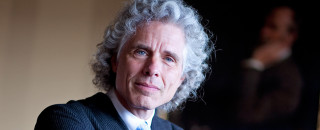Steven Pinker’s Rational World
By Michael Mozdy
Steven Pinker, PhD, is in the vanguard of humanist thinkers and writers today. A staunch defender of enlightenment thinking, he has written that “progress is a fact,” thanks to the past few centuries driven by scientific and technological achievement. His 2011 book, The Better Angels of Our Nature: Why Violence Has Declined presents an 800-page argument with over 100 graphs and maps in an effort to prove his point.
But as we confront years of divisive politics, thriving conspiracy theories, and Russia invading Ukraine in 2022, we question whether science and rationality are truly bringing us a “better world.”
Pinker’s latest book tackles this theme head-on: Rationality: What It Is, Why It Seems Scarce, Why It Matters. Tracing the fundamentals of rational thinking and the human biases that work against it, Pinker doesn’t back down from his argument that progress is a fact; instead, he tries to explain why it might seem that irrationality is taking the day.
Who is Steven Pinker?
Pinker is a Canadian-American academic who conducts research on language, cognition, and social relations. He currently serves as the Johnstone Family Professor in the Department of Psychology at Harvard University. Apart from being a beloved teacher at Harvard and having taught previously at Stanford and MIT, he is a prolific writer. In the past decade or so, he has branched out from his discipline into anthropology, history, and politics. Rationality is his 12th book (most of which are written for a popular audience), and he regularly contributes to The New York Times, the Guardian, Time, The Atlantic, and other magazines.
To say that he is well-regarded is an understatement. The list of awards his books have won is as long as his arm, and he has been named Humanist of the Year, Honorary President of the Canadian Psychological Association, Time magazine's Hundred Most Influential People in the World Today, Foreign Policy's 100 Global Thinkers, and is the recipient of nine honorary doctorates.
Complete Rationality
Fundamentally, Pinker sees rationality as a superior way to think and act in the world. He describes rationality by observing a number of benchmarks. “These are how you ought to reason,” he says. These benchmarks include tools like logic, probability, Bayesian reasoning (that is, calibrating your degree of credence in a hypothesis according to the strength of the evidence), statistical decision theory (that is, making a decision by setting a cutoff and utilizing cost/benefit analysis), game theory (what is the rational thing to do when the outcome depends on what other rational people decide to do?), distinguishing between correlation and causation, and the theory of expected utility or rational choice.
Of course, even Pinker admits that it’s nearly impossible for any single person to be the paragon of rationality all the time. To the question he phrases as “Why does it seem that everyone is losing their mind?”, he explores four major reasons: 1. reasoning motivated by things that matter personally (the “my side bias”), 2. primitive intuitions, 3. not believing legitimate expertise, and 4. holding mythological beliefs.
Yet Pinker is optimistic that we can do some practical things to combat irrationality. First, he would like to see rationality become the 4th “r” in education, along with reading, writing, and arithmetic. The goal, he states, is that “the tools of formal rationality should become second nature.” Second, he would like norms of rationality to be promoted. This means an open awareness of agreed-upon fallacies, basing beliefs on evidence, and seeing changing one’s mind based on evidence as a sign of strength. Third, he believes that institutions with rationality-promoting rules must be safeguarded. Examples are peer-reviewed science, democratic government, journalism, the judicial system, and academia with freedom of inquiry.
This last point is an important one. He asserts, “One person can notice and make up for another’s biases – making us collectively more rational than any of us individually.” This collective rationality ensures that checks and balances keep one person from becoming a tyrant, no matter how good at rational thinking he or she might be. Wikipedia is one of his favorite examples of a well-functioning collective rationality enterprise.
When we spoke with Pinker, he affirmed the fact that natural history museums like NHMU are one of these institutions that must be safeguarded. “They showcase how human ingenuity can replace mythology and superstition with well-grounded knowledge about ultimate questions, namely what is the nature of life, what is the nature of physical reality, what is the origin of our kind,” he says. “And museums periodically revise their exhibits in light of new knowledge.”
Beyond being bastions of rationality, Pinker enjoys how natural history museums “demonstrate both the diversity of societies and the universality of human nature.”
The Complication of Media and Echo Chambers
Pinker credits Bobby Duffy’s 2018 book The Perils of Perception: Why We’re Wrong About Nearly Everything for illustrating something called the availability bias. As Pinker extrapolates, “people’s radical misconceptions about the state of the world are very clearly driven by the amount of news coverage they hear.” In other words, the more you hear about something or a group of people, the more you tend to think that their influence is larger than it is.
Pinker goes one more step by calling this “news-driven ignorance,” and he points to this being a major complicating factor added to the things already making us think and act irrationally. “We need to make media literacy a part of the educational curricula,” he claims. “Part of being informed is noting the fragility of truth.” He asserts that humans tend to circulate stories instead of truths. “Truth telling is difficult. It’s only communities of people engaged in open speech and open criticism that give us any hope of approaching the truth,” he adds.
Finally, we asked him how we might combat self-curated social media bubbles of news and opinion. He responded, “There should be more of a commitment by social media companies to changing the ecosystem so that it’s more than an amplification of conspiracy theories and self-serving biases. Many people welcomed the democratization of opinionated journalism when the criticism was that a few profit-making organizations controlled the media. Now that perspective looks naïve after we’ve opened the floodgates of people to express their views and modify the facts. We now realize that institutions have a function, mainly to circumvent some of the biases that individual people are prone to.”
And this is the belief that keeps Pinker optimistic about the future – rule-governed institutions where collective rationality is allowed to thrive can continue to influence humanity’s greater good and human-driven progress will be the result.
Dr. Steven Pinker was a speaker in the 2022 Lecture Series. Click here to learn more about our upcoming Lecture Series here. Or, click here to read more about the 2022 Lecture Series.
Michael Mozdy is a guest writer for the Natural History Museum of Utah, a part of the University of Utah in Salt Lake City. Our mission is to illuminate the natural world and the place of humans within it. In addition to housing outstanding exhibits for the public, NHMU is a research museum. Learn more.

